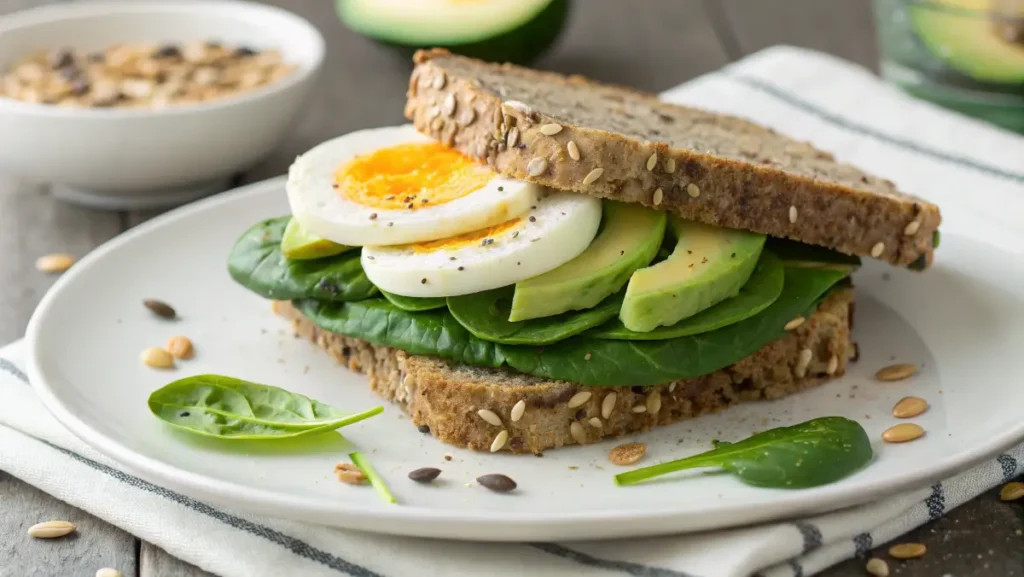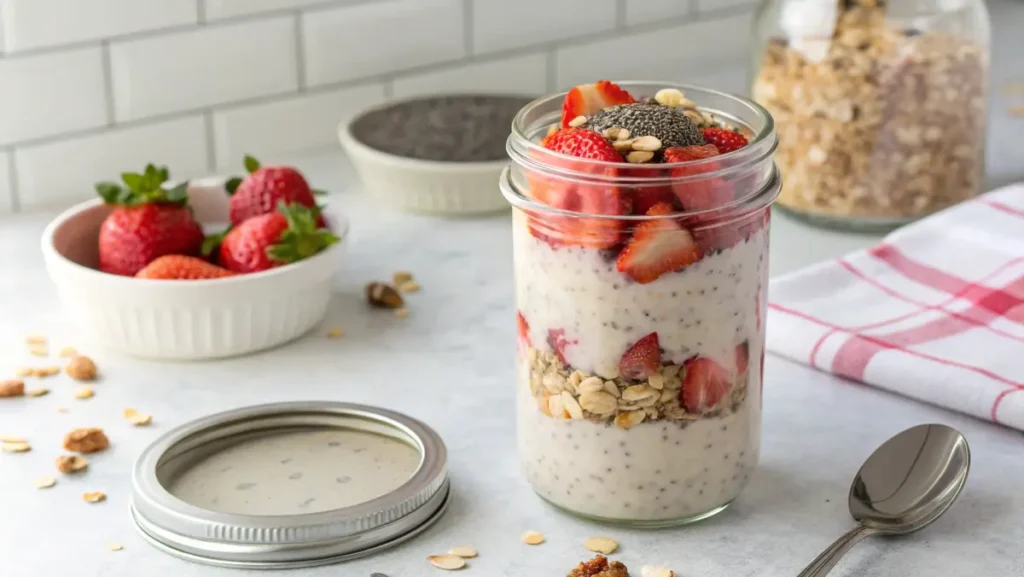Best PCOS Breakfast Recipes to Balance Hormones Naturally
Struggling with PCOS and unsure where to start your day? The right breakfast can make or break your hormone balance, energy levels, and cravings. In this comprehensive guide, we’ll walk you through the best PCOS breakfast recipes that help reduce insulin resistance, stabilize blood sugar, and support weight management—without sacrificing flavor. Whether you need high-protein options, low-carb meals, or quick grab-and-go ideas, we’ve got you covered.
Looking for inspiration? Try our Blueberry Cottage Cheese Breakfast Bake to fuel your mornings with balanced nutrition.
Let’s start by understanding how PCOS affects your mornings and why breakfast is the most crucial meal for managing it.
Table of Contents
Understanding PCOS and the Importance of a Healthy Breakfast
What is PCOS and How Does It Affect Your Metabolism?
Polycystic Ovary Syndrome (PCOS) is a hormonal disorder affecting nearly 1 in 10 women of reproductive age. It disrupts insulin regulation, increasing your risk for insulin resistance, weight gain, and irregular periods. But here’s the deal—what you eat first thing in the morning matters more than you think.
Your metabolism is already slower with PCOS. Skipping or eating high-carb breakfasts can spike insulin levels, causing fatigue and increased fat storage. That’s why a well-balanced breakfast tailored to your hormonal needs is essential.
Here’s a breakdown of how PCOS influences morning metabolism:
| Metabolic Impact | PCOS Without Breakfast | PCOS With Balanced Breakfast |
|---|---|---|
| Insulin Levels | Spikes and crashes | Stable and moderate |
| Cravings | Increased | Reduced |
| Energy | Low throughout the day | Sustained and consistent |
| Weight Control | Harder to manage | Easier to maintain |
Starting your day right sets the tone for better blood sugar management and reduced inflammation.
Why Skipping Breakfast Is a Bad Idea for PCOS Sufferers
Skipping breakfast may seem like a weight-loss shortcut, but it often backfires with PCOS. Here’s why:
- Leads to higher cortisol levels, which worsens insulin resistance.
- Triggers binge eating later in the day, especially carb-heavy snacks.
- Slows down your metabolism, making it even harder to burn fat.
Instead, eating a fiber-rich, high-protein breakfast can help reset your hormones and keep you fuller for longer. Think of it as fuel for your endocrine system.
Don’t miss our High Protein Overnight Oats recipe that’s PCOS-friendly, satisfying, and easy to prep ahead.
Nutritional Guidelines for PCOS Breakfast Recipes
The Role of Protein, Fiber, and Healthy Fats in PCOS Management
When managing PCOS, your breakfast needs to do more than just taste good. It should stabilize your blood sugar, reduce cravings, and support hormone function. That means protein, fiber, and healthy fats are non-negotiable.
Protein helps slow digestion, keeping you full longer. It also minimizes blood sugar spikes, which is key for PCOS.
Fiber keeps your digestion on track and feeds the good gut bacteria that influence hormones.
Healthy fats like avocado, nut butters, and seeds support your reproductive system and keep insulin levels balanced.
Here’s a quick guide for your plate:
| Macronutrient | Why It Matters for PCOS | Examples |
|---|---|---|
| Protein | Stabilizes insulin | Eggs, cottage cheese, tofu |
| Fiber | Lowers inflammation | Oats, chia seeds, berries |
| Healthy Fats | Supports hormone health | Avocado, almond butter, flaxseed |
Aim for a combo of all three to kickstart your day.
Which Foods to Embrace and Which to Avoid in the Morning
Choose foods that are whole, low-glycemic, and anti-inflammatory. These reduce insulin resistance and prevent hormone disruptions.
Best foods for PCOS breakfast:
- Eggs and egg whites
- Greek yogurt (unsweetened)
- Rolled oats or steel-cut oats
- Chia, flax, and hemp seeds
- Berries and apples
- Avocado
- Almond butter or peanut butter (natural only)
Foods to limit or avoid:
- Refined carbs (white bread, pastries)
- Sugary cereals
- Flavored yogurts
- Processed meats with nitrates
- Fruit juices and energy drinks
Check out Peanut Butter Overnight Oats for a naturally sweet, protein-packed option.
Keeping it clean and balanced isn’t just a diet—it’s a hormone reset every morning.
High-Protein PCOS Breakfast Recipes to Start Your Day Right

Egg-Based Breakfasts: How Many Eggs Are Too Many?
Eggs are one of the best breakfast staples for PCOS. They’re rich in protein, vitamin D, and healthy fats—nutrients many women with PCOS often lack.
But how many eggs should you eat?
Two to three eggs per serving is ideal for most women with PCOS. That gives you around 12–18 grams of high-quality protein without overloading on cholesterol or calories.
Try mixing in some egg whites to boost protein without added fat. You can scramble them with spinach or bake them into muffins with veggies and cheese.
Need an egg-based idea? Don’t miss our Egg-Free Breakfast Casserole if you want a no-egg alternative packed with flavor and protein.
Meatless High-Protein Alternatives for Vegans and Vegetarians
Not into eggs? No problem. There are plenty of high-protein plant-based options that work well for PCOS.
Some of the best meat-free proteins include:
- Tofu and tempeh
- Unsweetened soy or almond milk
- Chia seeds, hemp seeds, and flaxseeds
- Nut butters (watch portion size)
- Protein powders made from pea or rice
A quick idea: make a tofu scramble with veggies and avocado, or prep a chia seed pudding topped with berries and almond butter.
Pair these with whole grains like quinoa or oats for extra fiber and staying power.
Looking for inspiration? Try Healthy Suhoor Ideas for high-protein meals that double as perfect PCOS breakfasts.
PCOS Friendly Low-Carb and Keto Breakfast Recipes
Easy Low-Carb Recipes That Don’t Spike Insulin
Many women with PCOS benefit from a low-carb breakfast. It keeps insulin levels steady and reduces the risk of weight gain and hormonal imbalances.
Low-carb doesn’t mean no-carb. It means choosing carbs that digest slowly and support stable energy.
Great low-carb PCOS breakfast ideas:
- Scrambled eggs with avocado and sautéed spinach
- Coconut flour pancakes topped with almond butter
- Low-carb protein smoothies with chia seeds and unsweetened almond milk
You can also try grain-free breakfast bowls with cauliflower rice, eggs, and avocado.
For something quick, try a boiled egg with a side of berries and walnuts.
These options help curb cravings and prevent mid-morning crashes.
Keto-Friendly PCOS Breakfasts: What Works and What Doesn’t
Keto diets can work for PCOS, but they’re not one-size-fits-all. The key is focusing on quality fats and clean proteins—not just loading up on bacon and butter.
What works:
- Avocado egg boats
- Keto chia pudding
- Almond flour muffins
- Greek yogurt with flaxseed and cinnamon
What doesn’t work:
- High-fat meats like processed bacon
- Cheese-heavy casseroles with no fiber
- Butter coffee with no nutrients
Balance is key. A keto breakfast should still include some fiber and micronutrients to support hormone health.
Want a low-carb option with flavor? Discover great ideas like our Blue Zone Diet Breakfast to inspire your next PCOS-friendly morning.
Delicious PCOS-Friendly Breakfast Sandwich Ideas
What Is a PCOS-Friendly Breakfast Sandwich?
A breakfast sandwich can be PCOS-friendly if you build it smart. Skip the drive-thru versions packed with refined carbs and processed meats.
Instead, focus on low-glycemic breads, lean proteins, and healthy fats.
Start with:
- Ezekiel bread
- Whole grain English muffins
- Almond or coconut flour wraps
Then add fillings like:
- Scrambled eggs or egg whites
- Turkey or grilled chicken
- Avocado slices
- Leafy greens or sautéed spinach
Top it off with a sugar-free spread or a thin layer of hummus for added flavor.
These ingredients support stable blood sugar and long-lasting energy.

Low-Glycemic Bread and Smart Fillings to Use
Choosing the right bread is key. Many traditional breads spike insulin—bad news for PCOS.
Best bread options:
- Sprouted grain breads (like Ezekiel)
- Low-carb tortillas
- Sourdough (if tolerated)
- Almond flour buns
Smart fillings include:
- Hard-boiled eggs with avocado mash
- Turkey sausage with spinach
- Tofu scramble with tomato slices
- Cottage cheese with cucumber and herbs
Keep portions moderate and protein high. This keeps your hormones in balance and your hunger in check.
Check out Cottage Cheese Egg Bites as an easy filling or side dish for your sandwich.
Quick and Easy PCOS Breakfast Recipes for Busy Mornings
10-Minute Recipes That Keep You Full Until Lunch
Mornings can be chaotic, but your PCOS doesn’t take a break. You need meals that are quick, filling, and blood sugar-friendly.
Here are some fast PCOS breakfast ideas under 10 minutes:
- Avocado toast on sprouted bread with a poached egg
- Greek yogurt parfait with chia seeds and blueberries
- Almond butter banana wrap in a low-carb tortilla
- Microwaved veggie egg mug with spinach and cheese
Keep ingredients prepped in advance. This way, you’re just assembling, not cooking from scratch.
These meals offer balanced macros that prevent cravings and energy dips.
Portable and Prep-Ahead Options for Working Women
If you’re rushing out the door, prep-ahead breakfasts are your secret weapon.
Best make-ahead options:
- Overnight oats with protein powder
- Baked egg muffins with veggies and turkey
- Smoothie freezer packs with greens, protein, and berries
- Cottage cheese fruit bowls
Store them in individual containers. That way, you just grab and go.
Looking for inspiration? Try our Blueberry Cottage Cheese Breakfast Bake for a protein-rich option you can prep on Sunday.
Keep it simple, satisfying, and supportive of your PCOS journey.

PCOS Breakfast Recipes with Peanut Butter and Healthy Fats
Is Peanut Butter OK with PCOS? Let’s Break It Down
Peanut butter can absolutely be part of a PCOS-friendly breakfast—if you choose the right kind.
Look for natural peanut butter with no added sugar or hydrogenated oils. Just peanuts and salt.
It’s rich in healthy fats and protein, which help stabilize blood sugar and keep you feeling full.
Stick to 1–2 tablespoons per serving. Too much can add excess calories, even if it’s healthy.
Spread it on whole grain toast, mix into overnight oats, or swirl into smoothies.
Just watch your portion and pair it with fiber and protein.
Healthy Fats that Support Hormonal Balance at Breakfast
Fats are not the enemy. In fact, healthy fats are crucial for managing PCOS.
They support hormone production, improve insulin sensitivity, and reduce inflammation.
Top PCOS-friendly fats to eat in the morning:
- Avocado
- Nut butters (almond, peanut, cashew)
- Chia seeds
- Flaxseeds
- Walnuts
- Coconut oil (in moderation)
Pair fats with protein and fiber for the perfect morning trio.
Example: a slice of sprouted bread with peanut butter, topped with chia seeds and sliced banana.
Want more ideas? Check out our Peanut Butter Overnight Oats for a satisfying, hormone-friendly breakfast.
Surprising Breakfast Foods to Limit or Avoid for PCOS
Is Bacon OK with PCOS? The Truth About Processed Meats
Let’s talk bacon. Yes, it’s tasty. But for PCOS, it’s best to limit or skip it.
Most bacon is high in sodium, saturated fats, and preservatives like nitrates. These can increase inflammation and worsen insulin resistance.
Eating bacon occasionally isn’t the end of the world. But making it a breakfast staple? Not the best idea.
Better choices include:
- Turkey bacon (nitrate-free)
- Grilled chicken or turkey sausage
- Plant-based sausage with clean ingredients
Focus on lean, clean proteins. Your hormones will thank you.
Hidden Sugars and Additives to Watch Out for in Popular Breakfasts
Even “healthy-looking” breakfasts can hide sugar and additives that throw off your hormones.
Watch out for:
- Flavored yogurts
- Granola with added sugar
- Instant oatmeal packets
- Breakfast bars
- Fruit juices
These can cause blood sugar spikes followed by energy crashes. Not ideal for PCOS.
Instead, go for unsweetened versions and add natural sweetness with berries or cinnamon.
Also, check ingredient labels—if sugar is in the top 3, it’s probably not your best bet.
Don’t miss our guide to clean breakfasts like the High Protein Overnight Oats that are easy, tasty, and PCOS-friendly.
Creating a Weekly PCOS-Friendly Breakfast Meal Plan
How to Structure a Weekly PCOS Breakfast Schedule
Consistency is everything when managing PCOS. A weekly plan takes the guesswork out of your mornings.
Start by rotating three to four core recipes. This prevents boredom and ensures you get a mix of nutrients.
Here’s a simple weekly structure:
| Day | Breakfast Idea |
|---|---|
| Monday | Greek yogurt + chia + berries |
| Tuesday | Scrambled eggs + spinach + avocado toast |
| Wednesday | Peanut butter overnight oats |
| Thursday | Cottage cheese + sliced apple + flaxseed |
| Friday | Egg muffin + half an avocado |
| Saturday | Tofu scramble + whole grain wrap |
| Sunday | Blueberry cottage cheese breakfast bake |
Keep prep simple. Pre-cook eggs, chop veggies, and portion out ingredients in advance.
It saves time and keeps your week stress-free.
Meal Prep Tips and Grocery List for a Hormone-Balancing Diet
Prep once, eat all week. That’s the secret to staying on track.
Meal prep tips:
- Make a big batch of overnight oats
- Bake egg muffins in muffin tins
- Chop fruits and veggies ahead
- Pre-portion nut butters and toppings
Use containers to separate each meal. This makes grab-and-go mornings a breeze.
Here’s a basic grocery list to get started:
- Eggs
- Avocados
- Chia and flaxseeds
- Natural peanut butter
- Greek yogurt (unsweetened)
- Berries (fresh or frozen)
- Cottage cheese
- Sprouted grain bread
- Leafy greens
- Unsweetened almond milk
These staples support hormone health, curb cravings, and keep blood sugar steady.
Discover great ideas like our Healthy Suhoor Ideas for more planning inspiration.
Conclusion: Why Consistency Is Key in PCOS Breakfast Choices
Managing PCOS starts with one powerful habit—breakfast. What you eat in the first hour of your day impacts how your hormones, energy, and hunger behave for the rest of it.
A consistent routine with protein, fiber, and healthy fats keeps your insulin stable, supports weight management, and reduces inflammation.
Whether you choose a hearty egg scramble, a creamy overnight oat jar, or a sandwich packed with greens and lean protein, the key is balance and preparation.
Don’t forget to prep ahead, rotate your meals, and listen to your body. Start small. Stick with it. Your hormones will reward you.
Learn more about how to simplify healthy eating in our Egg-Free Breakfast Casserole and start your week strong.
FAQs
What is the best breakfast for PCOS?
The best breakfast for PCOS includes protein, fiber, and healthy fats. These nutrients stabilize blood sugar and reduce insulin spikes.
Great options include scrambled eggs with avocado, Greek yogurt with chia seeds, or overnight oats with protein powder. Keep it balanced and low in refined carbs.
How many eggs for PCOS breakfast?
Two to three eggs are ideal. That gives you enough protein to keep you full without overdoing cholesterol.
You can mix one whole egg with a few egg whites for a lighter option. Pair with veggies or a slice of sprouted bread for balance.
How do I start morning with PCOS?
Start your morning with hydration—a glass of water or lemon water helps.
Then eat a balanced breakfast within 60 minutes of waking. This helps regulate cortisol and insulin levels, setting your body up for stable energy.
What is a PCOS friendly breakfast sandwich?
A PCOS-friendly sandwich uses low-glycemic bread, lean protein, and healthy fats.
Try sprouted toast with a boiled egg, avocado slices, and spinach. You can also use almond flour wraps for a low-carb twist.
Is peanut butter OK with PCOS?
Yes, but choose natural peanut butter with no added sugar.
Stick to 1–2 tablespoons and pair with fiber and protein to keep blood sugar stable. It’s a great source of healthy fats when used in moderation.
Is bacon OK with PCOS?
Occasionally, yes—but it’s not ideal for daily consumption.
Bacon is processed and high in sodium and saturated fats. Try turkey bacon or skip it in favor of leaner, whole proteins like chicken or eggs.

